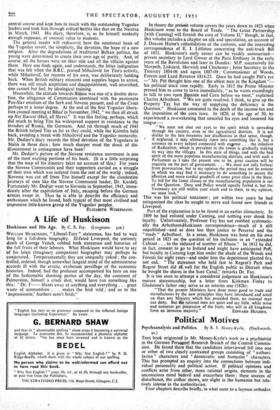A Life of Huskisson
Huskisson and His Age. By C. R. Fay. (Longman. 30$.)
WILLIAM Husetssort, " Liberal-Tory statesman, has had to wait, long for a full-dress biography. lll-fated Liverpool, the untimely death of George Veitch, robbed both statesman and historian of the full fruits of their labours. What Huskisson would have to say of his latest (imaginary companion) biographer may perhaps be conjectured. Temperamentally they are unequally yoked ; the con- trolled, ordered, though somewhat languid mind of the administrator accords ill with the erratic, exuberant persiflage of the economic historian. Indeed, had the professor accompanied his hero on one of the fashionable shooting parties of the day, the comment of Palmerston, himself a crack shot, would have run something like this: "Dr. F— blazes away at anything and everything . . . great waste of ammunition . . . makes the bird wild ; and as to the impressionist,' feathers aren't birds." In theory the preiet' volume covers the years down to 1823 when Huskisson went to> the Board of Trade. " The Great Partnership [with Canning] will furnish the core of Volume II," though, in fact, this voluthe includes a. chapter on silk and speculation, an account of I'. Deacon Hume's consolidation of the customs, and the interesting correspondence of E. J. Littleton concerning the anti-truck Bill of 1831. Huskisson's early career can be readily summarised— private secretary to Lord Gower at the Paris Embassy in the early years of the Revolution and later to Dundas: M.P. successively for Morpeth, Liskeard, Harwich and Chichester ; Joint Secretary to the Treasury 1804-06 and again 1807-09 Commissioner of Woods, Forests and Land Revenue 1814-23. Once he had caught Pitt's eye —" Mr. Pitt thought him one of the ablest men in the Kingdom "- his political stock rose rapidly. Early in 1815 the Prime Minister pressed him to come to town immediately, " as he wants exceedingly to talk to you upon jipanee and Corn before we meet," explained Charles Arbuthnot. '''We are quite resolved, I think, to give up the Property Tax but the way of supplying the deficiency is the Question." Huskisson consented to the death of the income-tax and the imposition of the corn laws. In 1820, at the age of 50, he experienced a re-awakening that unsealed his eyes and loosened his tongue:— " We must not shut our eyes to the spirit which is spreading through the country, even in the agricultural districts. It is not dislike to the late measures nor disaffection in that sense, though, if neglected, it may ultimately ripen into something like it, but a soreness on every subject connected with exsense . . . the infection of Radicalism, which is prevalent in the towns is gradually making its way into the villages. In this state of things, and with the bad spirit of the more populous manufacturing districts, and with such a Parliament as I take the present one to be, great caution will be requisite on the part of government. . . . We must not only forbear from provocation, but in my opinion the period may not be remote in which we may find it necessary to do something to secure the affection and more cordial goodwill of some great class in the State. To bid for the lower classes or the manufacturing population is out of the Question. Duty and Policy would equally forbid it, but the Yeomanry are still within your reach and to them, in my opinion, we must look."
This was his political testament ; yet within two years he had antagonised the class he sought to serve and found new friends in Liverpool.
Part of the explanation is to be found in an earlier climacteric. In 1809 he had enlisted under Canning, and nothing ever shook his loyalty. Unfortunately, Professor Fay has not combed systematic- ally the ArbuthnotIlluskisson correspondence—much of it still unpublished—and so does less than justice to Perceval and the " toady " Arbuthnot. In a sense, Huskisson was hoist on his own petard in 1823 on the question of his inclusion in an " extended Cabinet . . to the unheard of number of fifteen." In 1812 he did, in fact, consent to go to Ireland and might have anticipated Peel, but loyalty, to Canning kept him under the shade of the Woods and Forests for eight years—and under him the depirtinent planted firs, not oak. " The statesmen who held fast to Regent's Park and Regent Street did alL well for the English public as Disraeli when he bought the shares in the Sti6z Canal," remarks Dr. Fay.
It is too soon to attempt a considered judgement on Huskisson's mature statesmanship, but a letter from Kirkman Finlay to Gladstone's father may serve as an interim one (1826): "That the present Ministers have done more good to trade and
manufactures by the new principles they have introduced and acted on than any Ministry which has preceded them, no rational man can deny. But la rational men are quiet and say little, while noise and nonsense get possession of the fools, who will in all kingdoms






























 Previous page
Previous page